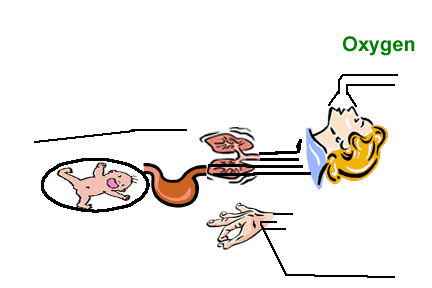General Anesthesia For Cesarean Delivery
| When is general anesthesia used? General anesthesia is used when a regional block is not the best choice for medical or other reasons. For example, when an urgent cesarean delivery is required, there may not be enough time to establish a regional anesthetic. Certain bleeding states may also preclude the use of a regional block. In addition, general anesthesia is used when a regional anesthesia fails to provide the proper amount of anesthesia necessary to keep you comfortable for the operation. Is general anesthesia safe for the baby? The medications used to induce and maintain a sleeping state are not harmful to the baby. In fact, they have minimal if any anesthetic effect on the baby. This is because the amount and type of medications used to induce sleep do not necessarily reach baby's brain in amounts required to make the baby sleepy. Therefore, although mothers are sleeping, babies are usually active and crying at birth. Your vital signs (breathing, blood pressure, heart rate) can change with the administration of anesthesia. Your anesthesiologist carefully follows these vital signs to ensure that they stay within the limits that are necessary for the well-being of the baby. Therefore, general anesthesia does not harm the baby. However, the reasons why a patient receives general, instead of regional, anesthesia (medical or obstetric complications) may sometimes have effects on the infant. |
 |
What is general anesthesia and how is it given? General anesthesia involves the administration of medications into a vein. The result is a rapid loss of consciousness. You will first be brought to the operating room where the safety monitors are applied. These include a blood pressure cuff, an oxygen monitor (clips on to the finger), and an EKG or heart monitor (stickers applied to the chest area). You will be lying on your back with your body slightly tilted. You will then be asked to breathe oxygen through a mask, which is placed over your mouth and nose. Soon after, medication is injected into the intravenous catheter and rapid sleep follows. Since your ability to breathe will be altered, it will be necessary to insert an airway tube into your mouth once you lose consciousness. This tube goes down the windpipe (the passageway to the lungs). This will enable the anesthesiologist to assist your breathing and ensure that you and your baby are getting enough oxygen. The tube also protects the lungs from being injured from any regurgitation which may occur while you sleep. Once the airway tube is in place, medications can be inhaled to maintain the sleeping state. Pain medications are given through the intravenous line to ensure comfort when you awaken. When the surgery is finished, the sleeping state diminishes as the medications are reversed. Your ability to breathe on your own also is restored. When you awaken, the airway tube in your mouth is removed and a light plastic oxygen mask will be placed on your face. What is the major concern of general anesthesia? One of the most significant concerns during general anesthesia is whether there is food or liquids in the mother's stomach. During unconsciousness, "aspiration" can occur, meaning that some stomach contents could come up and then go into the lungs. Here they could possibly cause pneumonia and breathing problems (see: Can I eat or drink during childbirth for an animation). Your anesthesiologist, therefore, takes extra precautions to protect your lungs. This includes the following: giving you an antacid to neutralize the stomach acid, and placing a breathing tube into your mouth and windpipe (breathing passage) after you are anesthetized (sleeping). As you fall asleep, you may also feel the pressure of an assistant's fingers just below your Adam's apple. This maneuver is done to minimize any regurgitation from reaching the lungs before the breathing tube is placed in the windpipe. Will I remember anything if I am asleep for the operation? You should have no recollection of any events that occur during the sleeping state. Recollection of events (awareness) is, however, rare. Even though some degree of alertness must be restored before removing the airway tube, most individuals do not recall this. |
